Howard Andrew Jones's Blog, page 50
December 31, 2014
A Brief Look Back
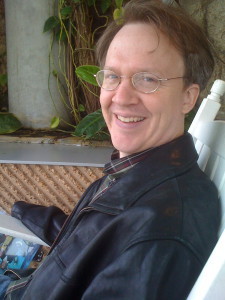 Last year about this time I looked back over the year and seemed to think I had my deadline issues under control and that I was in more balance, but it turns out I was deceiving myself. Honestly, I still haven’t figured out a non-stressful way to deal with deadlines, and I’m still not in balance, although I try.
Last year about this time I looked back over the year and seemed to think I had my deadline issues under control and that I was in more balance, but it turns out I was deceiving myself. Honestly, I still haven’t figured out a non-stressful way to deal with deadlines, and I’m still not in balance, although I try.
On the plus side, I continue to have a wonderful, supportive family.
This year has had its challenges, only some of which I’ve alluded to. My mother continues her long slow fade into Alzheimer’s, which is very sad to watch. My sleep apnea issues have returned in the last couple of months, so I guess it’s time for another appointment to see if the med team can figure out what’s wrong again. Sleep apnea sure beats diabetes or cancer or any number of other terrible diseases, but I’d be lying if I’d say it doesn’t suck to wake up feeling tired every single day.
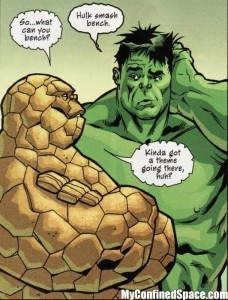 On the plus side, my endurance and health are both up, thanks to taking up karate again. I’m still a few months out from actually advancing toward that second degree black belt. When you’re out for five years it takes a long time to re-learn the katas, or forms. My replacement ACL is holding up beautifully and all the exercise is strengthening it. It no longer feels like my “bad leg” and I’m no longer instinctively favoring it when I jump or run.
On the plus side, my endurance and health are both up, thanks to taking up karate again. I’m still a few months out from actually advancing toward that second degree black belt. When you’re out for five years it takes a long time to re-learn the katas, or forms. My replacement ACL is holding up beautifully and all the exercise is strengthening it. It no longer feels like my “bad leg” and I’m no longer instinctively favoring it when I jump or run.
When it comes to writing, I remain fortunate to have contracts with two separate publishers and am working with two gifted editors. I finished writing three books this year, and while only one of them is fully polished, the others are solid drafts, and one of them is the longest book I’ve yet written, by a considerable margin. The new outlining technique I’ve mentioned several times while discussing writing technique is working very well for me. No, I’m still not as fast as I want to be, but I’m not as smart or as clever as I want to be, either. I remain a work in progress.
I hope visitors have been enjoying the blog. Visitor numbers are higher than ever, even though “Likes” and comments don’t seem appreciably more frequent. That may be because a lot of visitors comment on the Facebook page rather than here — which raises another interesting point, because recently it seems like FB “likes” don’t transfer from the FB page over to the web site. I’m not sure why, although I hear rumors about a changed FB policy.
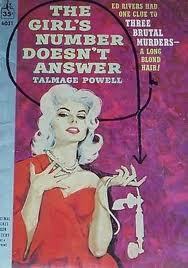 I read some great books this year, and John Hocking, Bill Ward, and C.S.E. Cooney and I have been sharing our thoughts about them with you. We’ll continue to do so in the coming year.
I read some great books this year, and John Hocking, Bill Ward, and C.S.E. Cooney and I have been sharing our thoughts about them with you. We’ll continue to do so in the coming year.
One of the strangest things is that although I’ve been working persistently and doggedly, there’s nothing now on the bookstore shelves to show for it. Three books are written, but two of them won’t be out until next year about this time. That’s disappointing to fans and to me, but it does give me a lot of lead time. For instance, the sequel to one of them already has a finished draft, and the sequel to the other series is under way. That means that when those books DO come out, fans won’t have to wait that long to see the next installment. Hopefully I’ll be better positioned to really push my career forward.
As I look into the next year I see that I’ll be facing some new challenges — my first born will be headed off to a college that’s several hours away. I’m proud of him but I know I’ll miss him terribly. His absences will alter my relationship with my daughter, who will be the only child in the house. That won’t be quite like having an only child, but it will feel a little bit that way.
There will be more books to write, more horse fence to repair, and further surprises and challenges. May it be that those surprises will be pleasant, and that we stay happy, healthy, and successful. I’ll have fingers crossed that we can meet challenges gracefully and that mostly good things lie before us.
As for me, I’ll do my best to keep seeking balance, and strive always to be a better father, husband, friend, and writer. Here’s hoping for a good year for all you good people out there. May you meet your own challenges with brave faces, and come through stronger.
December 29, 2014
December Update
 I hope all of you have been having a pleasant December.
I hope all of you have been having a pleasant December.
As usual, silence here means that I’ve been busier than usual. First it was with writing, or, rather, revision, up until the day before Christmas Eve. Then it’s been with traditional and pleasant holiday things like picking out gifts and wrapping them and meeting old friends and gathering with family.
I’ve taken some time off for reading some different books and to play Battle Academy 2, my chief present this year.
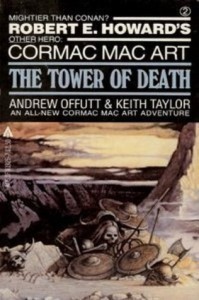 The best gifts this year at the Jones household — or at least those that brought the most joy — were probably the mountain bike for my daughter, the wonderful drawing my son made for my wife of the final scene in Watership Down (her favorite book), and the tea cup my daughter picked out for her mother.
The best gifts this year at the Jones household — or at least those that brought the most joy — were probably the mountain bike for my daughter, the wonderful drawing my son made for my wife of the final scene in Watership Down (her favorite book), and the tea cup my daughter picked out for her mother.
The favorite gift I received was Battle Academy 2. I mentioned the first Battle Academy last year. This one is a World War II tactical game set on the Eastern Front. There are no continuing characters or even units carried over from scenario to scenario, so I don’t feel compelled to play and play to see what happens next so that entire days disappear. Each battle stands on its own, like a puzzle.
I can’t precisely say why I enjoy the game as much as I do, because I’ve always been an ancient history buff. But I have fun with it in the evenings, and winter seems a good time for video games. It certainly plays well and has an easy-to-learn interface and I enjoy most of the engagements — although I prefer the shorter and non-urban ones where I get to wield more tanks.
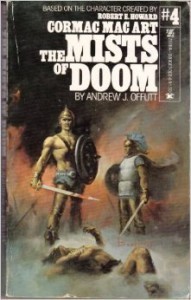 I was looking at my bookshelf a week ago at some of the books that have been on there for twenty years or more and decided I’d really better get to reading them or getting rid of them. Thus I finally tackled the first two Cormac Mac Art novels, the first by Andrew Offutt and the second by Andrew Offutt and Keith Taylor.
I was looking at my bookshelf a week ago at some of the books that have been on there for twenty years or more and decided I’d really better get to reading them or getting rid of them. Thus I finally tackled the first two Cormac Mac Art novels, the first by Andrew Offutt and the second by Andrew Offutt and Keith Taylor.
For those of you not in the know, Cormac Mac Art is a minor Robert E. Howard character, an Irish pirate wandering around with a crew of Danish raiders in the 5th century. REH never wrote much about him, but Offutt, sometimes with Taylor, penned six novels. The first two have held up nicely. I can’t say that they were earth shatteringly great in that everyone needs to drop what they’re doing and start reading now, but they were quite good at delivering exactly what they set out to do.
If you’re interested in tales of battle and adventure mixed in with elements of mystery and the fantastic, you should seek them out. The conflicts are vivid, the central characters clever, and the prose is artful. Frequently there are turns of phrase that make me stand up and take notice, particularly little pieces of description about character, scenery, or life during the time period. They are head and shoulders better than the run of “Clonan” barbarians that I think are much more widely read from the same period. You know the ones I mean — Brak, Thongor, Kothar, etc. (although I will defend the Thongor short stories as fun romps).
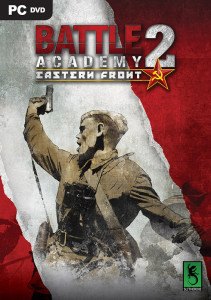 For the rest of the week I’ll be working in a little bit of revising and writing, but mostly I’ll be doing family things. We found out my son got into the college of his choice, with a nice scholarship, which was the best Christmas surprise of all, but he still needs to complete his art portfolio and apply for some additional scholarships (so he doesn’t end up with huge student loan debt). And that means I’ll need to be doing some proddding.
For the rest of the week I’ll be working in a little bit of revising and writing, but mostly I’ll be doing family things. We found out my son got into the college of his choice, with a nice scholarship, which was the best Christmas surprise of all, but he still needs to complete his art portfolio and apply for some additional scholarships (so he doesn’t end up with huge student loan debt). And that means I’ll need to be doing some proddding.
My office needs to be tidied up, the basement needs to be organized, a cabinet door needs to be repaired, and I need to haunt Kayak and similar sites to try and get the excellent plane ticket prices my wife spotted on the 23rd that have since gone up 4oo dollars. I really don’t understand the airline industry, but I think I’m likely going to be in the doghouse for not snagging those low prices while I had the chance, unless they lower again soon. Keep fingers crossed for me!
Anyone else out there give or receive some goodies they wanted to share? Anyone else enjoy Battle Academy or these Cormac Mac Art books?
December 26, 2014
Lord Dunsany Re-read: Time and the Gods Part 2
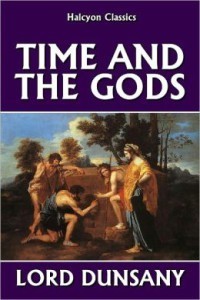 Bill Ward and I are continuing our Lord Dunsany re-read with the next two stories published in the original Time and the Gods (not the omnibus). You can find a free copy of the book here and join in the discussion. Our rating system is pretty simple. One star is a standout, and two stars is truly notable. Most of Lord Dunsany’s fantasy work is already fairly remarkable, so even a “no star” story on this scale may be worth a look.
Bill Ward and I are continuing our Lord Dunsany re-read with the next two stories published in the original Time and the Gods (not the omnibus). You can find a free copy of the book here and join in the discussion. Our rating system is pretty simple. One star is a standout, and two stars is truly notable. Most of Lord Dunsany’s fantasy work is already fairly remarkable, so even a “no star” story on this scale may be worth a look.
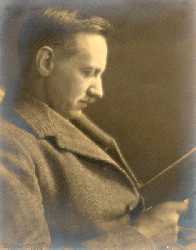
Lord Dunsany
First with “The Coming of the Sea” last week and then with this week’s “A Legend of the Dawn” and “The Vengeance of Men,” we’re coming to Lord Dunsany at his best, where the excellence of his writing becomes a matter of routine. Much like the ease with which Lennon and McCartney seemed to be able to crank out hit singles, one by one Lord Dunsany conjures up these little gems of fable, each dripping with amazing moments and phrases and concepts. Creating myths-that-should-have-been, he explains the different ways that twilight falls and the different enemies conspiring to steal the sun, and the birth of the moon and the stars, and describes how pestilence stalks men. In a word, it’s fantastic. Perhaps only Tanith Lee has invented so many stories that feel so much like they might have been myths conceived by and spread through an entire ancient culture. I’ll turn it over to Bill for more specific analysis.
Bill: “A Legend of the Dawn:” * Here is Dunsany’s creation myth of the day/night cycle, and instead of a metaphor of life and rebirth, Dunsany offers the charming notion of a child and her beloved toy. Iuzana, a child of all the gods, plays with the golden ball of the sun, throwing it high in the air to create the first day, though eventually it falls back to earth and is lost. In a cycle that repeats itself seven times (and in many places parallels the biblical genesis myth) various gods go to reclaim the sun, for none can abide to see the Dawnchild despondent at the loss of her toy (not even the silver ball of the moon, given to her when she lost the sun, can appease her).
There is some really creative metaphorical story telling here — such as all the gods creating the stars as torches in their search for the golden ball, and all those stars being extinguished by Night once the ball was reclaimed outside of her cave — and it really feels like a cohesive myth. The end, promising a future apocalypse for the gods (and tying in with the next story) is startling after a somewhat playful story of innocence and devotion, and is much stronger than the literal apocalypse that happens in the climax to “Time and the Gods,” for here we see the gods as beings with personality and emotion.
Howard: Bill saw further than me on this one. I had actually grown just a little weary of Iuzana constantly losing the ball, but Bill counted and found the seven days of the week (rather than the eight to which Lennon/McCartney allude). Kudos to Bill for seeing it and golf clap to Lord Dunsany for giving us a full week. And two stars from me for what I think is simply a brilliant little myth, for all of its fine touches. But are there no goddesses? For apart from Iuzana, child of all the gods, I find none mentioned. I can’t recall if some turn up later. I hope so.
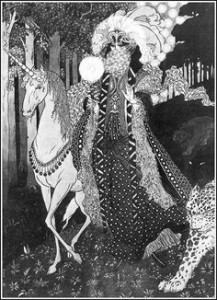
More Lord Dunsany inspired art by Sidney Sime.
Bill: “The Vengeance of Men:” It’s clear at this point that this story cycle is a chronological unfolding of the Pegana “mythos,” and this story follows more or less directly from the previous one. Our first mention of mortal men is when, on the seventh day, Iuzana gives her golden ball to a human boy to play with in the last tale, and the eventually apocalypse of the gods previously alluded to is the crux of “The Vengeance of Men.”
The language of the King James Bible seems even stronger here than before, which is most suited to the subject matter of the men of Arim, forgotten of the gods, who made gods of their own and were punished for it by Pestilence. In the end it is a mortal priest who sees what the gods cannot, and informs them of their eventual doom — so now the gods must live out their existence always dreading their prophesied fate. Dunsany does a magnificent job of moving from an almost playful tale to one that weighty and grim, despite both stories being stylistically consistent with one another.
Howard: I think you’re right with the King James Bible tone. I don’t know that I’ve been this creeped out by the depiction of the vengeance of a god since the first time I saw the plagues from The Ten Commandments. Pestilence is downright frightening. All the different ways that it attacks humans are chilling (and that it can only be seen by them once it has gripped them). But then the casual way that the gods send forth pestilence is chilling as well, and it is nice to think that there is some justice coming to the gods for being so callous with their handing down of fates. One star from me for this one.
Of the two, “A Legend of the Dawn” is my favorite not just because of all the reasons we already cited, but for a dozen other moments, like the hound of the gods which is thunder, or the rain and mist that carry away the sun, pursued by the valiant north wind and his sword of ice, or the descriptions of the mountains that seem to hide the golden dawn in a brilliant casket. Beautiful, beautiful stuff. Lord Dunsany is not only masterful and inspiring, he’s peerless. I’m wanting to run out and grab other fantasy readers and shake them and say: “Read this! It’s great! Until you try this you won’t see that you’re nattering on about lesser artists — see how a genius does it!”
Next week Bill and I will continue reading, moving on to “When the Gods Slept” and “The King That Was Not.” Hope to see you here.
December 19, 2014
Lord Dunsany Re-Read: Time and the Gods Part 1
 Bill Ward and I are continuing our Lord Dunsany re-read, starting with the first two stories published in the original Time and the Gods (not the omnibus). You can find a free copy of the book here and join in the discussion. Our rating system is pretty simple. One star is a standout, and two stars is truly notable. Most of Lord Dunsany’s fantasy work is already fairly remarkable, so even a “no star” story on this scale may be worth a look.
Bill Ward and I are continuing our Lord Dunsany re-read, starting with the first two stories published in the original Time and the Gods (not the omnibus). You can find a free copy of the book here and join in the discussion. Our rating system is pretty simple. One star is a standout, and two stars is truly notable. Most of Lord Dunsany’s fantasy work is already fairly remarkable, so even a “no star” story on this scale may be worth a look.
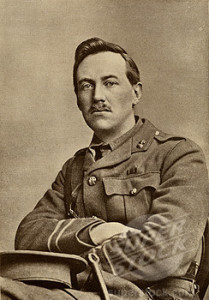 Howard: Time and the Gods is what really turned me on to the power of Lord Dunsany. I’d read a tale or two in other collections and found them interesting, but I tried reading his first volume of short stories with only a little success. I didn’t become a convert until I dipped into Time and the Gods. It’s more quintessentially “Dunsanian.” It’s less self-conscious than the latter work and more approachable than the earlier. Here he seems overcome with inspiration and excitement about creating these wonderful cycles of mythology from whole cloth.
Howard: Time and the Gods is what really turned me on to the power of Lord Dunsany. I’d read a tale or two in other collections and found them interesting, but I tried reading his first volume of short stories with only a little success. I didn’t become a convert until I dipped into Time and the Gods. It’s more quintessentially “Dunsanian.” It’s less self-conscious than the latter work and more approachable than the earlier. Here he seems overcome with inspiration and excitement about creating these wonderful cycles of mythology from whole cloth.
Bill: I agree. These are the sorts of stories I always associated with Dunsany.
“Time and the Gods:” Both of these stories (perhaps the entire collection?) are told in the mythic tradition, with Dunsany writing in the poetic and antique style I most associate with his work. The great themes are there from the word “go” as well as fabulous forbidden cities, and the vast ever-changing expanse of eons of time. Here Time is the “swarthy servant” of the gods, who dispatch him on missions to smite or heal while remaining aloof in their immortal marble city of Sardathrion. But it seems even the gods and their city are not immune to Time, who will call no one master for long. Effective mythic-style personification, but I thought the story was a bit too much in the style-over-substance camp (especially when contrasted with the following tale!), with the lamenting of the gods in dialog not really delivering the emotional punch that a better narrative climax could have. Top marks for a sword-armed, bloody-handed Time overthrowing Sardathrion, symbols of such intimate and immediate violence are not what I expected in an anthropomorphized time, where something like an old, patient, bearded man with an hourglass would seem the cliche norm.
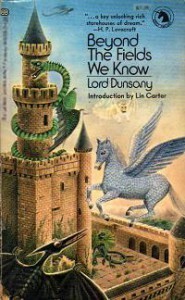 Howard: That’s an excellent point. On re-reading this I found myself nodding and thinking, yes, this is good Dunsany, but it’s not yet great, and here are the familiar themes, Time, for instance, ready to cull all that we hold dear, and the fall of a beloved city. But I’d forgotten what you say here — the inventive handling of Time as an entity that even the gods learn to fear. I wonder if anyone else had ever written anything quite like this? I don’t recall seeing Time turn up in any similar way in the works of Dunsany’s few predecessors.
Howard: That’s an excellent point. On re-reading this I found myself nodding and thinking, yes, this is good Dunsany, but it’s not yet great, and here are the familiar themes, Time, for instance, ready to cull all that we hold dear, and the fall of a beloved city. But I’d forgotten what you say here — the inventive handling of Time as an entity that even the gods learn to fear. I wonder if anyone else had ever written anything quite like this? I don’t recall seeing Time turn up in any similar way in the works of Dunsany’s few predecessors.
Still and all, I’m not starring this one. It’s Dunsany, which makes it remarkable enough. But there are far more remarkable works in his canon.
Bill: “The Coming of the Sea:” ** It’s hard not to think of the rugged Irish coastline of Dunsany’s home while reading this, and his language certainly rises to the occasion in describing a war between the sea and the land. Slid, a new god, the personified sea, “gleaming azure and fair with a thousand smiles, and swayed with a thousand moods,” appears on earth one day and starts conquering the land of the gods “inch by inch and mile by mile.” The four winds are sent against him, but cannot stop him.The rivers of the world are seduced by Slid’s sighing song and flow out to meet him — the channels they carve in the hills and cliffs of the land are breeches in the gods’ defenses. Finally it is only Tintaggon (perfect name), mightiest of mountains, that can stand against Slid, standing firm even against the combined might of five oceans. The victory preserves the green valleys of the gods, but only in a perpetual stalemate between mountain and sea, with a future as yet unknown. This story has everything working in balance, and is a wonderful example of taking the tools and metaphor of myth and combining it with a modern narrative approach. Two stars.
Howard: Well said. This is a majestic, mythic story. Once I read this for the first time I knew I was on to something really fabulous. Jack Vance and Dunsany are worlds apart, but they share this — they can toss off dozens of fascinating ideas or incidental descriptors almost with contemptuous ease. You can imagine other artists scrambling after these scraps to gather them before they float away so that they can explore them more fully. Vance and Dunsany also are alike in their sheer ability to invent from whole cloth places and moments and, on Dunsany’s part, stories that feel like true myths we just never heard before.
Did I mention I love this little tale? Two stars from me as well.
Hope you’ll join us next week for the next two stories, “A Legend of the Dawn” and “The Vengeance of Men.”
December 15, 2014
Hardboiled Monday: Mike Dime and Stickman
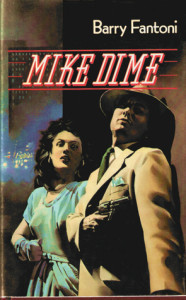 As with preceding Hardboiled Mondays, Chris Hocking and I are working our way down the master list in alphabetical order. Details and the list are here. And earlier discussions are here.
As with preceding Hardboiled Mondays, Chris Hocking and I are working our way down the master list in alphabetical order. Details and the list are here. And earlier discussions are here.
Today Chris and I are looking at two excellent, little-known, and hard-to-find private eye novels by Barry Fantoni, Mike Dime and Stickman.
Chris: Barry Fantoni worked on the British satire magazine Private Eye from 1963 to 2010. I understand that in addition to being an author, he’s both a poet and a jazz musician. Stateside the guy seems to be little known, but he’s the author of two memorable detective novels that are purest Chandler homage. These two books, Mike Dime and Stickman, were last produced by the UK publisher Sphere back in 1982, and are rarely seen in the USA. I blundered into Mike Dime in a closet-sized used bookstore in Nice, and found (triumphantly) its even rarer sequel Stickman, in a mystery bookshop in Toronto.
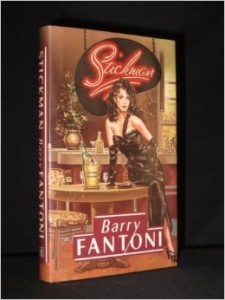 The point is that there are probably a lot of American mystery readers, detective fiction fans, and admirers of Chandleresque writing who have never heard of Fantoni and his creation. And that is just wrong.
The point is that there are probably a lot of American mystery readers, detective fiction fans, and admirers of Chandleresque writing who have never heard of Fantoni and his creation. And that is just wrong.
Howard: These two are a skilled and loving tribute to the private eye genre, and bring Philadelphia in the post-war years to life as successfully as Chandler presented southern California. You get the sense that you’re moving through a real time and place, which is the more impressive because Fantoni was writing historical fiction rather than contemporary drama.
They’re clearly inspired by Chandler, but Mike Dime doesn’t feel like a Marlowe clone and Fantoni doesn’t quite pull off a pitch-perfect Chandler Sytle wise, like Paul Pine. I think that’s intentional.
Chris: With an easy verve for the amusing Chandler-inspired turn of phrase, Fantoni’s books walk a line that veers close to parody. There’s plenty of wise commentary…
Then Uglo did something with his mouth that looked like a smile. But I wouldn’t have known about that. It wasn’t something I had seen a policeman do before.
And broad similes…
He was no taller than the Empire State and no wider than the Grand Canyon.
This wry tone is so steady that it’s a bit of a shock that not only does it not grow tiresome, it actually provides consistent amusement. Fantoni exaggerates the Chandler style, but does so with skill.
While his style and intent is in no way similar to that of Norbert Davis, Fantoni has in common with Davis the ability to switch gears from light and bantering to dead serious and frightening at the drop of a fedora.

Writer, artist, and editor Barry Fantoni.
At times the jaunty tone of the narrative falters and the melancholy side of the hardboiled detective genre gleams through with rare poignancy. The detective tries to do right, find the truth, right the wrongs, and when he finally does these things his reward is often no reward at all. He learns things he wishes he never knew, and sees his success eclipsed by both the damage it leaves in its wake and by the greater, unassailable wrongs in the world at large. There is a scene in Stickman which captures this chill melancholy as well as anything I’ve read in the genre. A scene of sorrow so honest, yet so unrecognized, that it comes across as darkly comic.
There are some genre-standard thugs, and at least one show-stopping, old-school, no-apologies femme fatale who seems to have escaped from a Mickey Spillane novel, but these familiar elements don’t detract from the enjoyment derived from reading what is basically a heartfelt, skillfully wrought love letter to Raymond Chandler and the fictional detectives he inspired.
Howard: I liked them quite a lot, and I fully plan to re-read them. They were well structured and they transported me into another time and place. The mysteries were top notch — suspenseful, with good twists and turns. I couldn’t see where they were going but it all made sense when the ends came around. Stylistically Stickman is probably just a little stronger. I remember enjoying them equally well, but moments from the first one stick out more clearly for some reason.
In any case, I thoroughly endorse tracking these down. I’m sort of surprised that Fantoni didn’t write any more of them, but he seems to have been busy in other fields, and it may be that the work didn’t receive the appreciation it deserved.
December 12, 2014
Lord Dunsany Re-Read: “The Avenger of Perdóndaris”

Lord Dunsany
Bill Ward and I are continuing with our Lord Dunsany re-read with a follow-up to one of Dunsany’s greatest, “Idle Days on the Yann.” Here’s a link to the Gutenberg edition of Tales of Three Hemispheres, one of Lord Dunsany’s later (and to my mind weaker) collections. Towards the very end of the collection are “The Avenger Of Perdóndaris,” which we discussed this week. As always, our rating system is simple. Any Dunsany story tends to be fabulous, so one star is a standout and two is something remarkable.
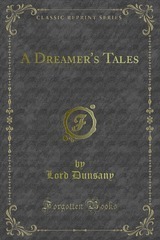 Bill: ‘The Avenger of Perdondaris” almost seems to turn the previous story on its ear, in so far as the events in the Land of Dream really aren’t the point, it’s the “framing story” that has taken over. Our narrator wishes to go back to the Land of Dreams in order to learn the fate of the Elephant Hunter Singanee who set out to avenge Perdondaris, the city that was completely destroyed in “Idle Days on the Yann.” The method of the narrator’s return parallels that of “A House on Go-By Street,” though the curiosity shop and its proprietor have changed. Once in the Land of Dream we again meet of the witch who presides at the transition point — her “pearls before swine” dialog is amusing and perhaps also a little sad, for what artist hasn’t felt that way?
Bill: ‘The Avenger of Perdondaris” almost seems to turn the previous story on its ear, in so far as the events in the Land of Dream really aren’t the point, it’s the “framing story” that has taken over. Our narrator wishes to go back to the Land of Dreams in order to learn the fate of the Elephant Hunter Singanee who set out to avenge Perdondaris, the city that was completely destroyed in “Idle Days on the Yann.” The method of the narrator’s return parallels that of “A House on Go-By Street,” though the curiosity shop and its proprietor have changed. Once in the Land of Dream we again meet of the witch who presides at the transition point — her “pearls before swine” dialog is amusing and perhaps also a little sad, for what artist hasn’t felt that way?
Howard: I loved that bit, probably because I’ve seen it done before but never quite in that way. And I should say I agree with you that “Avenger” does feel like it turns “Go-By” on its ear. It’s a companion piece. It feels to me that these last two are much more closely related that either is to “Idle Days on the Yann.”
Bill: The details of the fabulous court of the Elephant Hunter are classic Dunsany, and he learns indeed that Perdondaris has been avenged — the great beast’s other tusk is now in fact the bridge over which one approaches Singanee’s palace (Interesting also that the first tusk was a door to a city — so both tusks occupy thresholds or crossing points). No one saw the struggle of Hunter versus Beast however, and Singanee himself will not speak of it, instead “his mighty deed was given to the poets and became their trust forever.” I wonder if these were different poets than those digging pearls and being flogged for their pains. The idea that the deed itself is perhaps more valuable in the imagination — since we are in the Land of Dream — than it would be as a literal or factual retelling, beautifully evokes the shared logic of dreams and myths. The entire sweep of Perdondaris’ destruction and avenging happens ‘off camera’ in these stories, and the hints we get build a real aura of mystery about the whole thing. They are dreams within dreams, things we can only imagine despite our journeying in the realm of imagination itself.
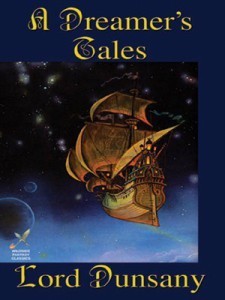 But I think this story really says what it needs to say when Dunsany tries to return to London and takes a wrong door — he is far in the future, in a ruined and empty landscape. He finds that his boat moored in the Thames has rotted away — the mirror image of the Bird of the River in ‘Go By Street.’ His confusion and fear recollects the perils of madness in the Land of Dreams, and the entire episode — he of course finds his way to his proper time and place by backtracking — reinforces the witch’s statement that everything is an illusion, both Dream and ‘the fields we know.’
But I think this story really says what it needs to say when Dunsany tries to return to London and takes a wrong door — he is far in the future, in a ruined and empty landscape. He finds that his boat moored in the Thames has rotted away — the mirror image of the Bird of the River in ‘Go By Street.’ His confusion and fear recollects the perils of madness in the Land of Dreams, and the entire episode — he of course finds his way to his proper time and place by backtracking — reinforces the witch’s statement that everything is an illusion, both Dream and ‘the fields we know.’
For several stories now I’ve been wondering if Dunsany is conveying his fatigue with the fantastic. Being worked to death in ‘The Unhappy Body’ only to depict poets as being flogged in ‘Go-By’ and completely unappreciated (and, really, seemingly mindless) in ‘Avenger.’ In ‘Go-By’ he has difficulty finding his way back (giving up politics helped!) and, when he does, his Dreams are no longer the ones he sought. In ‘Avenger’ he knows true terror at the prospect of not getting back to his proper place, and several times expresses that he would be quite happy with the mundane world. Those notions of the author’s emotional journey over his career as a fantasist, and the other richly symbolic images and events of this trilogy of stories, renders these as tales that will no doubt reward additional readings. Two stars.
Howard: I’m definitely feeling that he’s weary of the fantastic, which would make sense given that we’re reading some of his later short stories. It’s a tone that wearies me just a little and I’m looking forward to digging back into his earlier work. I feel just a little like I’ve been listening to those road songs from rock bands. Perhaps you know the ones: “oh, here we are on the road and we’re rock stars, but life is hard.” Being a rock star probably isn’t all full of glamour like we imagine, but I’m not sure I want to hear rock bands complaining about it anyway. I think artists should commiserate with each other, not moan about it in public.That’s too harsh for what Lord Dunsany’s doing here, though. There are many moments of brilliance in such a short little story. I love the little lies that the narrator has to tell to explain some of the modern customs he has to follow, and the glimpse he has of one of the golden dragons, and the sapphires that are dumped over the cliff to feed them. I think the poets watching butterflies to find out where the pearls are may be one of my favorite bits, though. Lord Dunsany has a soft spot for those trying to craft prose and poetry (I think he probably refers generally to an “artist” when he writes “poet.”)
That of course the pigs don’t want pearls puts me in mind of one of Lord Dunsany’s greatest, “The Assignation:”
Fame singing in the highways, and trifling as she sang, with sordid adventurers, passed the poet by.And still the poet made for her little chaplets of song, to deck her forehead in the courts of Time: and still she wore instead the worthless garlands, that boisterous citizens flung to her in the ways, made out of perishable things.
And after a while whenever these garlands died the poet came to her with his chaplets of song; and still she laughed at him and wore the worthless wreaths, though they always died at evening.
And one day in his bitterness the poet rebuked her, and said to her: “Lovely Fame, even in the highways and the byways you have not foreborne to laugh and shout and jest with worthless men, and I have toiled for you and dreamed of you and you mock me and pass me by.”
And Fame turned her back on him and walked away, but in departing she looked over her shoulder and smiled at him as she had not smiled before, and, almost speaking in a whisper, said:
“I will meet you in the graveyard at the back of the Workhouse in a hundred years.”
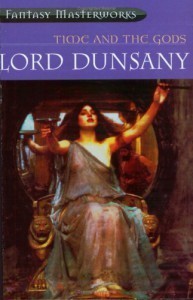 Bill: Oh wow. And you know, here we are, a hundred years later…
Bill: Oh wow. And you know, here we are, a hundred years later…
Howard: And Lord Dunsany’s still appreciated. I started to write “is still going strong” but I think he is more famed as an innovator than he is famed for being read, which is a real shame.
Next week Bill and I will be reading the first two entries from one of Lord Dusnany’s greatest collections (and then moving on through the rest of the collection from there): Time and the Gods. You can find a free copy of the book here and join in the discussion. Hope to see you! (Note that the lovely copy to the right is the omnibus — we’re just reading the ORIGINAL collection, although we recommend picking up the omnibus if you can find it, because it contains six of his eight fantasy short story collections.
December 10, 2014
Writing Well
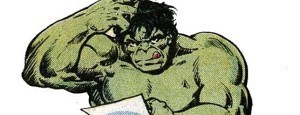 I’m starting to think that writing is easy and that it’s writing well that’s the hard part.
I’m starting to think that writing is easy and that it’s writing well that’s the hard part.
My new outlining method has worked wonderfully for me all year. I remain excited by it. It is not, however, the complete solution to all my writing problems.
It ensures that all the bones are in place and that everything makes sense plot wise so that I don’t write dead-end scenes that end up having to be cut. But, because I start with a very rough framework, it can take longer than I might like to whip the prose itself into shape. On the plus side, it means that my writing process HAS gotten much faster. But it’s still not as fast as I would like. I can complete a rough draft in three months, but it might take another month or two to punch it into proper shape. Now that’s not a bad thing, certainly, especially when some of my first books took more than a year to write. But in an industry that doesn’t pay particularly well 4-5 months isn’t a useful tempo. I’m not sure what to do about that except keep fingers crossed that the next books sell even better so that 4-5 months profits me more.
Process wise, though, I keep coming back to some essential truths.
1. I write better with an outline.
2. I write better when I remember to ask what every character wants before I write the scene.
3. I write better when I have the villain’s motives and powers figured out well in advance.
4. I benefit greatly when I get feedback from a small cadre of beta readers. They can point out things I missed. Most of mine have drifted away, and having recently benefited from some careful reading by the talented and generous Dave Gross I see clearly that I need to get back to trading critiques with my fellow writers.
I know ALL of these lessons. I’ve known all of these lessons for a long time. Perhaps one of these years I’ll remember all of them, constantly, so that I can stop repeating the same mistakes and get on to learning some new ones…
December 8, 2014
Icky Monday
 It’s been a miserable few days here at the Jones household. First my eldest came down with something that knocked him out of commission on Tuesday and Wednesday. Then it hit my wife and me. Head cold, general aches, that kind of thing. I managed to work through it on Thursday after resting a little extra, fully expecting to bounce back by Friday. I have a pretty high constitution, despite the fact that I’m not a particularly robust looking guy, and I almost never get sick.
It’s been a miserable few days here at the Jones household. First my eldest came down with something that knocked him out of commission on Tuesday and Wednesday. Then it hit my wife and me. Head cold, general aches, that kind of thing. I managed to work through it on Thursday after resting a little extra, fully expecting to bounce back by Friday. I have a pretty high constitution, despite the fact that I’m not a particularly robust looking guy, and I almost never get sick.
This time, though, my wife and I got worse and worse, bad enough that she called in Friday (by Thursday she had mostly lost her voice). Bad enough that Friday, Saturday, and Sunday, I wasn’t good for anything except lying on the couch. Usually I’m the first one in the family to bounce back from anything, but this time it hit me the hardest. I did some reading, but I was in enough discomfort that writing or revising weren’t real options. Today I finally feel about as good as I felt last Thursday, which is pretty icky, but which is the picture of health compared to the last three days.
It’s wonderful now not to have an unrelenting sinus headache that feels like someone’s taking a pick axe to my skull, and I look forward to having the rest of the symptoms dissipate as well. This whole experience has been a stark reminder of how much I take my good health for granted and how I should be a lot more grateful for it.
In any case, despite reading through a mountain of hardboiled fiction while sick, there’s no Hardboiled Monday today because I was reading to help ignore the pain and haven’t had a chance to analyze anything. There are mounds of laundry to do, bills to write, papers to file, a grocery trip necessary, and many, many revisions that still need to be done on the several works in progress.
Also, now that I can apparently sleep without waking up sneezing or shivering I think I might take a couple of long naps, because I still feel pretty beat.
Next year I’m definitely getting the flu shot.
I hope the rest of you are well.
December 5, 2014
Lord Dunsany Re-read: A House on Go-by Street
 Bill Ward and I are continuing with our Lord Dunsany re-read with a follow-up to one of Dunsany’s greatest, “Idle Days on the Yann.” Here’s a link to the Gutenberg edition of Tales of Three Hemispheres, one of Lord Dunsany’s later (and to my mind weaker) collections. Towards the very end of the collection are “A Shop in Go-By Street,” and “The Avenger Of Perdóndaris.” Next week we’ll be discussing “Avenger.” This week we read “Go-By Street.”
Bill Ward and I are continuing with our Lord Dunsany re-read with a follow-up to one of Dunsany’s greatest, “Idle Days on the Yann.” Here’s a link to the Gutenberg edition of Tales of Three Hemispheres, one of Lord Dunsany’s later (and to my mind weaker) collections. Towards the very end of the collection are “A Shop in Go-By Street,” and “The Avenger Of Perdóndaris.” Next week we’ll be discussing “Avenger.” This week we read “Go-By Street.”
Howard: This was the first Lord Dunsany story I’ve read where I felt tension. I thought I’d read it before, but it seemed new to me, because I honestly was waiting, breathless, to see whether the narrator could get back to the Yann. There was less distance between the reader and the events this time than I’ve felt before in a Dunsany story, perhaps because I could relate so well to the narrator’s desperate search for a way back to the land of dreams and the magic he found there. And I exulted with him when he found the way, and I enjoyed with him the delights along his path and all the marvelous little Dusnany-esque asides, like the dreams of dead poets and the sleeping gods and how forlorn Time will be when the Gods are finally dead, and the fate of those who prophesy the word of dead gods.
But then, of course, he reaches the Yann and finds what he finds and I get the message I was afraid I’d find all along — that you can’t go home again. And this left me feeling incredibly sad. It’s a valid point, and a true one, and one I feel too bitterly and strongly anymore, which is why I so wanted the narrator’s quest to succeed.
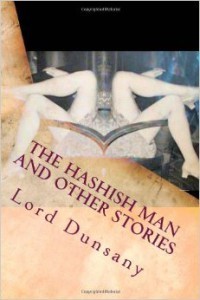 I enjoyed the interchange with the witch and her cat at the very end, but I have to admit that I walked slump shouldered away from this one. I missed the Yann and the boat and the captain and the sailors, and was so very sad to find them gone along with so much else. I too well know how much we need to cherish what we have because tomorrow it may be gone, and I wanted Dunsany to lie to me.
I enjoyed the interchange with the witch and her cat at the very end, but I have to admit that I walked slump shouldered away from this one. I missed the Yann and the boat and the captain and the sailors, and was so very sad to find them gone along with so much else. I too well know how much we need to cherish what we have because tomorrow it may be gone, and I wanted Dunsany to lie to me.
But I think it’s a poor reviewer who judges a story on what they thought it should be about rather than whether or not it succeeded at its intent, so I’m giving it a star.
Bill: It did have more tension, I think Yann’s narrator almost feels as distant as the kind used in a framing story, and this time Dunsany is actually moving the plot, rather than drifting downstream. And I agree it was sad, it was almost a subversion of the first tale, you can’t go home again, not even in dreams, not even in illusion. The next story (I read ahead!) picks up on that as well.
Dunsany’s great theme of time comes across strongly here, for he doesn’t just wait in vain for the Bird of the River to pick him up, he actually discovers a remnant of that ship, which has rotted away long ago. We learn a bit more about the Land of Dream as well, and how it is a place of the gods that sleep, gods that “will die by the bedside of the last man.” Dunsany’s head reels as he contemplates time: “for my imagination went out into those far years and looked back at me and mocked me because I was a creature of a day.”
 The difficulty in returning to the Land of Dreams is interesting, almost as if Dunsany the author is sharing a genuine difficulty he may have had summoning such flights of the imagination though, he says, once he gave up politics “the wings of his fancy strengthened.” But he had, he admits, forgotten how to get there, and it’s only through the shop in Go-By street, a shop of impossible things, that he finds his way back. The witch he meets on the other side, with the field of flowers that are the dreams of poets, becomes more important in the next story, and she is a kind of guardian of the threshold and guide. To her, all things are illusion, dreams and life alike.
The difficulty in returning to the Land of Dreams is interesting, almost as if Dunsany the author is sharing a genuine difficulty he may have had summoning such flights of the imagination though, he says, once he gave up politics “the wings of his fancy strengthened.” But he had, he admits, forgotten how to get there, and it’s only through the shop in Go-By street, a shop of impossible things, that he finds his way back. The witch he meets on the other side, with the field of flowers that are the dreams of poets, becomes more important in the next story, and she is a kind of guardian of the threshold and guide. To her, all things are illusion, dreams and life alike.
But she is no friendly presence like the crew of the Bird, and the tension certainly gives this whole story a different feel. Unlike in “Yann,” the most perilous moment of which was the suggestion of the great beast that would destroy Perdondaris, here we have a real threat aimed straight at our narrator — the possibility of going insane. I don’t think Dunsany had ever hinted at that in any of the stories we read before, but here he must cross quickly through a forest filled with unseen beasts that rarely attack but, when they do, they rob a dreamer of his sanity (Dunsany references Hanwell Asylum — could it be that only the mad can revisit the same dream again and again, and spend all their days on the Yann?). Dunsany’s lonely vigil for the boat to appear has a different quality about it as well, for the first time he is stationary in this realm, not moving, and I felt that the wondrous landscape of the jungle became more claustrophobic and dangerous than when he was idling by in the last story.
Great name checking of all the cities and people mentioned in ‘Yann,’ and I was pleased to see a mention of Bethmoora slip in there as well. Dunsany’s style shifts a bit as well as he transitions from our world to the Land of Dream, his lush and poetic language once he enters the realm of the Yann are perhaps heightened by this story having begun in more a more mundane setting. I give it two stars — all three of these “Yann” stories are quite rich and offer plenty to think about in addition to being full of marvelous images.
Howard: That’s it for this week. I hope you’ll join us for the next Lord Dunsany story the coming Friday, and then we’ll jump into Time and the Gods.
December 1, 2014
Hardboiled Monday: The Mouse in the Mountain
As with preceding Hardboiled Mondays, Chris Hocking and I are working our way down the master list in alphabetical order. Details and the list are here. And earlier discussions are here.
Today we’re looking at Norbert Davis’ The Mouse in the Mountain.
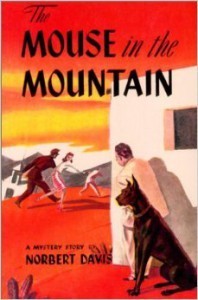 Chris: Davis is widely regarded as one of the few authors able to mix straightforward humor into hardboiled fiction.
Chris: Davis is widely regarded as one of the few authors able to mix straightforward humor into hardboiled fiction.
With a style that was sharp, lucid and wry, Davis could draw surprisingly effective humor from relaying a realistic conversation or describing a simple situation. The oddities and simple difficulties of human communication seem to have fascinated him.
Here’s an exchange from his short story, “Something for the Sweeper.”
“Hi,” said Jones, stopping and standing on his left foot.
The man made another dab with his broom, inspected the result, and then looked up at Jones. He was an old man, small and shrunken and wiry, with white, smooth hair that was combed straight back from his softly plastic face. He nodded silently at Jones, solemn and wordless.
“Hendrick Boone live here?” Jones asked.
The old man sniffed and rubbed his nose. “Who?”
“Hendrick Boone.”
The old man considered for a moment. “Live where?”
“Here,” said Jones.
“Yes, “ said the old man.
Jones stared at him sourly. “Thanks a lot,” he said at last.
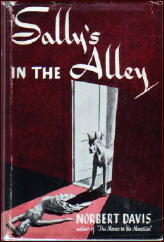 So you have this calm transcription of a realistic, yet pretty silly, conversation, and a page or two later you get sharply described danger and violence, with sentences like…
So you have this calm transcription of a realistic, yet pretty silly, conversation, and a page or two later you get sharply described danger and violence, with sentences like…
The knife was a flat hissing glitter coming at Jones.
You have to wonder how the author was able to balance these polarities as well as he did. He does an especially fine job of this in his novel, The Mouse in the Mountain.
Howard: Possibly because of the abrupt shift in tone between this and other entries on the list I didn’t take to this book as quickly as I had some of the others. I was amused by the dry, understated wit in the dialogue of the opening scenes, but it took me two tries to really get involved. It proved entertaining, with a good mystery and engaging characters. I wasn’t compelled to immediately seek out the further adventures of Doan and Carstairs, although I was sufficiently impressed with author Davis to pick up a collection of his short stories about the detective Max Latin. I may eventually try out Sally in the Alley, and I can see myself re-reading sections of Mouse, if not the entire book.
Chris: In this novel Doan, a physically unimpressive detective, travels to Mexico with his dog, a very physically impressive Great Dane named Carstairs. There is a hunt for a fugitive from the USA, a Mexican bandit, three murders and a memorably described earthquake. The overall effect is a pleasingly breezy, fast-paced read broken by swift jolts of suspense and danger that somehow seem all the more intense against the light background.
Howard: I’d completely forgotten about the earthquake, a fine example of Davis bringing a moment to life with incredibly precise prose. You’re absolutely right in your description of the overall effect — not every hardboiled detective needs to read like an homage to Hammett or Chandler. Davis succeeds very well in carving a place for himself. His delivery is droll and sometimes made me smile, but I think what I liked about him best were the succinct flourishes he used to describe a moment or a person or an action sequence.
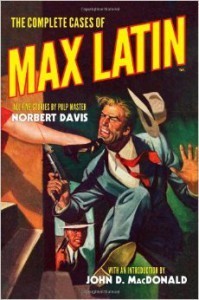 I enjoyed him, and I think with further study I can learn from him. My guess is that I’ll enjoy his shorter stories so I can take the comedy in smaller doses.
I enjoyed him, and I think with further study I can learn from him. My guess is that I’ll enjoy his shorter stories so I can take the comedy in smaller doses.
Chris: I put Norbert Davis on the list because I thought his work showed how the world of classic hardboiled fiction was more diverse than might be expected, because I thought it was a great deal of fun, and because I don’t believe there is another author in any genre quite like him.
Howard: Humor’s a tricky thing and it may be that I’m a hard man to please. I recall that when my friends were laughing roundly and passing around A Hitchhiker’s Guide to the Galaxy I found it occasionally amusing, not hilarious. Your own mileage may vary with The Mouse in the Mountain, but Chris is right in that Davis can infuse noir with humor, certainly no easy trick.
Chris: I’m compelled to offer an odd aside. When I worked in a big bookstore in a college town philosophy students came in now and again looking for books by Norbert Davis, all of which were out of print at the time. It turns out that philosopher Ludwig Wittgenstein was a fan of Davis and especially of The Mouse in the Mountain.
Howard Andrew Jones's Blog
- Howard Andrew Jones's profile
- 368 followers



